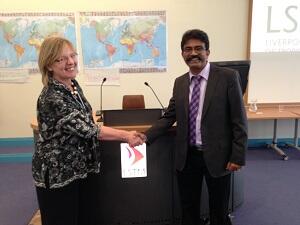
LSTM’s seminar series continued today with a presentation by Dr Dinesh Baswal, Deputy Commissioner of Maternal Health, Government of India. His seminar, “Work of the National Health Mission for Millennium Development Goals 4 & 5” was introduced by Professor Nynke van den Broek, head of the Centre for Maternal and Newborn Health (CMNH).
Before Dr Baswal spoke, there was a brief introduction from CMNH’s Terry Kana, a midwife, who spoke about the importance of midwives in recognition of the International Day of the Midwife earlier in the week.
Dr Baswal began his presentation by reminding the audience of the eight millennium goals that were set in September 2000 at UN HQ in New York. Each of the goals was set a deadline of 2015, and Dr Baswal’s seminar was based upon the efforts within India to reach goals four and five, to reduce child mortality and improve maternal health respectively.
Focussing first on MDG 4 he explained that seven states have already reached the MDG 4 target of 38 per 1000 live births; with a significant drop in the figures since the launch of the National Health Mission (NHM) in 2005.
Looking at MDG 5 Dr Baswal pointed out that maternal deaths in India had reduced from 149,000 in 1990 to 47,100 in 2010, a 70% drop, which is bringing them inline to meet the target set for MDG 5 ahead of its deadline in 2015.
He then went on to look at the many initiatives that have been brought about which are, in part at least, having a significant impact on India reaching its goals, including adding work with adolescents into the current health programmes. He explained the 5x5 matrix that had been introduced to look at five key interventions within five thematic areas - reproductive health, maternal health, newborn health, child health and adolescent health (RMNCH+A). Each of the interventions across the thematic areas has to be implemented with high coverage and high quality. He looked at improvements in infrastructure, human resources, drugs and diagnostics and referral transport systems that are being put in place to strengthen health systems.
Dr Baswal then went on to talk through cash incentives to both mothers and health workers to ensure more institutional deliveries, new child screening and intervention services ensuring a systematic approach to the early identification of what are described as the 4Ds: defects at birth, deficiency, diseases and disability in children 0-18 years old, and what needs to be done to address early pregnancies and unsafe abortions.
He concluded by looking at what India is doing in terms of multi skilling, quality assurance, ensuring skilled birth attendance for home deliveries, using data for decision making, strong monitoring and supervision of health workers and ensuring accountability, all of which is working to ensure that India continues to see the strong improvements it has seen over recent years.